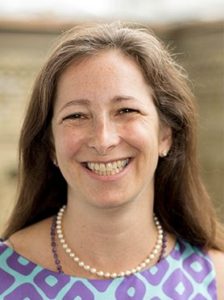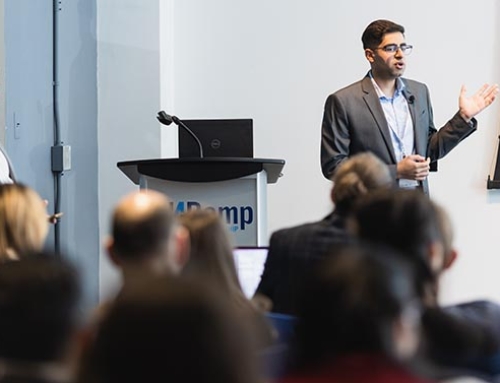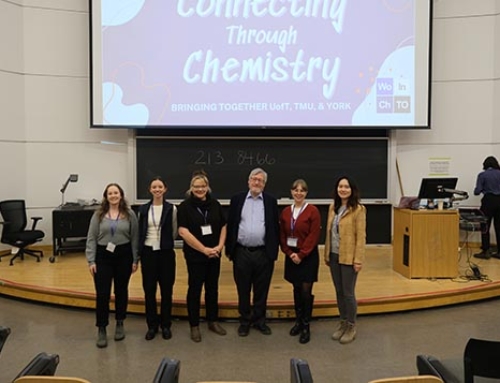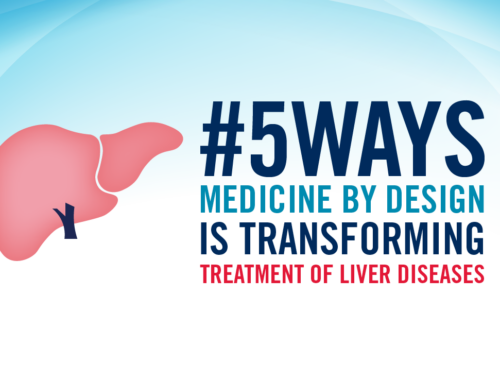
Alok Kanti, CEO of Bayer in Canada, Robert Deans, chief technology officer of BlueRock Therapeutics, Mary Haak-Frendscho, CEO of Blueline Bioscience, and Michael Laflamme, senior scientist at University Health Network, participate in a panel at the Cell Transplantation Workshop on the creation of BlueRock Therapeutics. Jennifer Moody, vice-president of commercialization at CCRM, moderated the panel. (Photo by Laine Jaremey/CCRM)
Nearly 100 researchers, post-doctoral fellows, graduate students and bioscience industry representatives gathered at Hart House on March 10 to discuss cell transplantation in regenerative medicine, from basic science to translation.
The event, led by Medicine by Design’s retina team, included talks by principal investigators from several of the initiative’s team projects that are tackling diseases such as blindness, heart failure and stroke, as well as the safety of cell therapy. A panel composed of key players behind the creation last year of BlueRock Therapeutics also provided a case study of the opportunities and challenges in translating regenerative medicine discoveries from the lab to the clinic.

University Professor Molly Shoichet leads the Medicine by Design retina team, which organized the Cell Transplantation Workshop.
“Clinical translation is a key goal of our retina cell transplantation project and a priority for Medicine by Design,” said Molly Shoichet, University Professor and Canada Research Chair in Tissue Engineering. “We were delighted to bring together the research and business colleagues required to deliver on the promise of regenerative medicine in an afternoon of insight, exploration and promising translational science.”
Launched with a $225 million (U.S.) investment from Bayer AG and Versant Ventures — one of the largest series A financings the bioscience sector has ever seen — BlueRock is collaborating with Gordon Keller, director of the McEwen Centre for Regenerative Medicine, and Michael Laflamme, a senior scientist at University Health Network, to advance their work in regenerating heart muscle to treat heart failure.
At the symposium, Laflamme described the more than 15 years of basic research that led to the BlueRock investment and the ongoing challenges that his lab is tackling. Senior executives with BlueRock, Bayer and Blueline Bioscience, a Toronto-based biotechnology incubator backed by Versant, also spoke about the launch of BlueRock and the opportunities and challenges of translating and commercializing regenerative medicine discoveries, particularly in the Canadian context.
Other Medicine by Design-funded principal investigators who spoke at the workshop included Shoichet, Derek van der Kooy (Department of Molecular Genetics, Faculty of Medicine) and Shana Kelley (Leslie Dan Faculty of Pharmacy), who are part of a team developing cell-based therapies to restore sight in patients with age-related macular degeneration. Cindi Morshead (Division of Anatomy, Faculty of Medicine), who leads a team project investigating stem cell transplantation to treat stroke, and Andras Nagy (Lunenfeld-Tanenbaum Research Institute, Sinai Health System), another Medicine by Design-funded principal investigator who is working with collaborators at University Health Network and SickKids to develop “fail-safe” cells to improve the safety of cell therapy, also shared their research.
The workshop also offered an opportunity for the next generation of regenerative medicine researchers to present their work. Seventeen trainees took centre stage to give one-minute poster presentations — the academic equivalent of speed dating. Winners of the poster prizes were Nikolaos Mitrousis from Shoichet’s lab for a poster titled “Cell transplantation restores vision to completely blind mice”; and Arturo Ortin Martinez from the laboratory of Valerie Wallace for a poster titled “GFP transfer from donor to host cells after retinal photoreceptors transplantation.”
Gary Bader, Medicine by Design’s associate director for knowledge mobilization, said events such as the workshop are key to accelerating discoveries from the laboratory to the clinic.
“Innovation grows when leaders across the regenerative medicine ecosystem share research, new approaches and best practices,” said Bader, a professor at the Donnelly Centre for Cellular and Biomolecular Research and a Medicine by Design-funded principal investigator. “This event has sowed the seeds of new collaborations across our community, from basic research to commercialization, and Medicine by Design is proud to support it.”
Learn more about resources that are available to Medicine by Design-funded principal investigators to support workshops and scientific discussion sessions.





